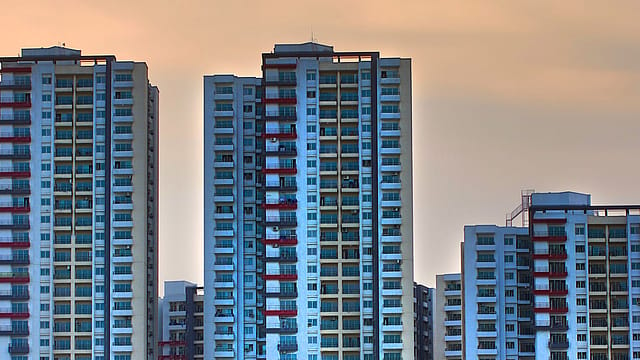Housing prices rise 11% in Delhi-NCR, 1% in Mumbai
ADVERTISEMENT

Average residential housing prices in India increased 4% year-on-year in the first quarter of 2022, while unsold inventory declined marginally, signalling a revival in demand, according to a report.
Delhi-NCR saw the highest 11.3% year-on-year surge in housing prices to ₹7,363 per square foot in the January-March period as developers increase prices led by robust demand and higher input prices, the Credai-Colliers-Liases Foras Housing Price Tracker Report 2022 shows. Real estate prices in Delhi have increased by 43% since the beginning of the pandemic two years ago.
Housing prices, however, remained stable in the Mumbai Metropolitan Region (MMR) amid several new project launches. Property prices in Mumbai, Bengaluru and Chennai appreciated 1% each to ₹19,557, ₹7,595 and ₹7,107 per square foot, respectively, the report shows.
While MMR accounts for the largest share of unsold inventory at 32%, Bengaluru saw the highest drop in unsold inventory at 23%.
Hyderabad saw the second-highest year-on-year change in housing prices after Delhi-NCR. The city witnessed a 9% increase in residential real estate prices to ₹9,232 per square foot.
Meanwhile, Ahmedabad saw an 8% appreciation in property prices to ₹5,721 per square foot and Kolkata witnessed a 6% rise in housing prices to ₹6,245 per square foot.
In Pune, prices of residential properties went up by 3% to ₹7,485 per square foot.
"January-March quarter 2022 witnessed the new launches back to the pre-Covid level. The coming quarters see an increasing flow of new launches. The fresh supply will induce an improvement in volumes. Thus, the sales will continue to grow despite the recent increase in the interest rates," says Pankaj Kapoor, managing director, Liases Foras.
The appreciation in housing prices comes at a time when commodity prices have gone up significantly due to the Russia-Ukraine war.
To improve domestic availability of steel, the government on Saturday imposed a 15% export duty on a range of finished steel products and hiked export duty on iron ore fines and lumps from 30% to 50%. The Centre also withdrew the 5% and 2.5% import duties on coke and coal, respectively, to bring down raw material prices for steelmakers.
Harsh Vardhan Patodia, president of Credai, hopes that manufacturers will pass on the price cuts to end-users. "We are pleased with the finance minister and the government's intervention to control the rise in the cost of raw materials and in turn control inflation as the Indian economy had stayed resilient while grappling with the strains of cost inflation of raw material prices but had disrupted the growth of the real estate sector in the last 18 months," Patodia says.
The finance minister's assurance to improve logistics and help domestic availability of cement and lowering custom duties on coal products used in the production of cement will have a positive impact on the cost of the commodity, he says. "A reduction in prices of fuel tax to pre-Covid levels will help bring down the transportation costs of all raw materials and essentials in industries agnostic of their businesses and reduce the pressure on the end consumers... This will help the real estate developers negate increased construction costs over the last 2 years, which will only help prospective homebuyers."